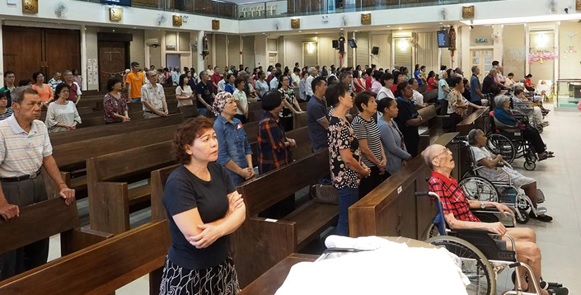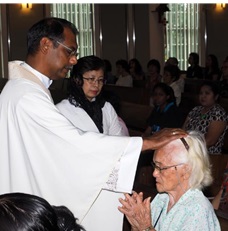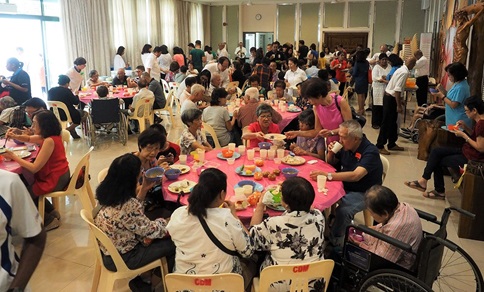The World of the Sick was celebrated on 19th February, at the Church of Divine Mercy, Penang (CDM) with morning mass and anointing of 50 Catholics who ranged from the oldest at 93 years and youngest at 28 years together with three non-Catholics who came for a blessing. This number was a small increase from the 47 Catholics who came last year.

In his homily, Fr Martin Arlando explained that this year’s theme was “You have received without payment, give without payment” (Matthew 10:8). This was also the command that Jesus had given to his apostles when sending them out. Fr began by relating a story of a soldier returning from the war to a final reunion with his dying mother. His mother could only be saved by a blood transfusion of blood group AB-. This was during a time when blood transfusions were not the norm, let alone finding someone with such a rare blood group. The situation seemed hopeless and final. But on his way home to change his uniform before saying the final goodbye to his mother, he stopped to give another soldier a ride. In the silent ride the hitchhiking soldier sensed a sadness in his driver and asked what was the matter. In explaining his hopeless circumstances he found out that the soldier was a blood type AB-. As it turned out his mother was given the blood transfusion and lived another 47 years. Was the donor just a soldier or an angel of God in uniform. That was never ascertained. With this true story, we are all reminded that Jesus provided his blood to save us. It is because without his generous sacrifice there is no forgiveness and we all would not be saved.
For this reason Pope Francis in the 27th World Day of the Sick message on 11th February, urged for believers to promote a culture of generosity. His Holiness also noted that the joy of generous giving is a barometer of the health of a Christian. Fr Martin reiterated the words of the pope that those who care for the sick and give of themselves generously and straightforward love are among the Church’s most credible evangelizers. Just as life is a gift from God and cannot be reduced to a personal possession or private property, caring for the sick requires professionalism, tenderness, straightforward and simple gestures freely given, like a caress that makes others feel loved.
His Holiness had said that life is a gift from God. Saint Paul asks: “What do you have that you did not receive?” (1 Cor 4:7). Precisely because it is a gift, human life cannot be reduced to a personal possession or private property, especially in the light of medical and biotechnological advances that could tempt us to manipulate the “tree of life” (cf. Gen 3:24).
Pope Francis also pointed out the difference between a gift and gift-giving. “Gift” means more than simply giving presents: it involves the giving of oneself, and not simply a transfer of property or objects. “Gift” differs from gift-giving because it entails the free gift of self and the desire to build a relationship. It is the acknowledgement of others, which is the basis of society. “Gift” is a reflection of God’s love, which culminates in the incarnation of the Son and the outpouring of the Holy Spirit.
Each of us is poor, needy and destitute. When we are born, we require the care of our parents to survive, and at every stage of life we remain in some way dependent on the help of others. We will always be conscious of our limitations, as “creatures”, before other individuals and situations. A frank acknowledgement of this truth keeps us humble and spurs us to practice solidarity as an essential virtue in life.
Such an acknowledgement leads us to act responsibly to promote a good that is both personal and communal. Only if we see ourselves, not as a world apart, but in a fraternal relationship with others, can we develop a social practice of solidarity reliant on others, because individually and by our own efforts we cannot overcome our limitations. So we should not fear, then, to acknowledge those limitations, for God himself, in Jesus, has humbly stooped down to us (cf. Phil 2:8) and continues to do so; in our poverty, he comes to our aid and grants us gifts beyond our imagining.
The Pope gave the example of Saint Mother Teresa of Calcutta – a model of charity who made visible God’s love for the poor and sick. In all aspects of her life, she was a generous dispenser of divine mercy, making herself available for everyone through her welcome and defence of human life, of those unborn and those abandoned and discarded. She bowed down before those who were spent, left to die on the side of the road, seeing in them their God-given dignity; she made her voice heard before the powers of this world, so that they might recognize their guilt for the crime – the crimes! – of poverty they created. For Mother Teresa, Mercy was the ‘salt’ which gave flavour to her work; it was the ‘light’ that shone in the darkness of the many who no longer had tears to shed for their poverty and suffering. Her mission to the urban and existential peripheries remains for us today an eloquent witness to God’s closeness to the poorest of the poor”.
Fr also added that the Pope said that generosity inspires and sustains the work of the many volunteers who are so important in health care and who eloquently embody the spirituality of the Good Samaritan. Volunteer work passes on values, behaviours and ways of living born of a deep desire to be generous. It is also a means of making health care more humane.

At the end of the homily Fr related the story of a family who were so poor that they decided to cut out pictures of presents that they would like to give each other at Christmas. Among the presents was a picture of just the three of themselves gathering around in a family hug by 6 year old Pete. This proved to be the best presentless gift. The gift of family and boundless love for each other. Fr then led the congregation in a meditative exercise of showing the gift of ourselves to God and resigning to the will of God’s love and grace.
The mass ended with Fr presenting each of the sick with an “ang pow” and two oranges. Everyone was then invited for a fellowship lunch in Faustina Hall. Most of those who came found this celebration a most happy and auspicious one. An interesting story was related of how a non-Catholic but a Christian was invited to the mass. Rose Gasper met her cancer survivor friend Theresa Chu at the market and asked her if she would like to join in for mass that coming Saturday. She said she would and expressed her gladness of coming at the fellowship after mass. Some mentioned that they had now come resigned to God’s will for them and not be overly concerned if they were to be healed or not. Just to be spiritually connected with God was their prior concern.

Written by
Dr. Ivan Filmer
20th February, 2019

